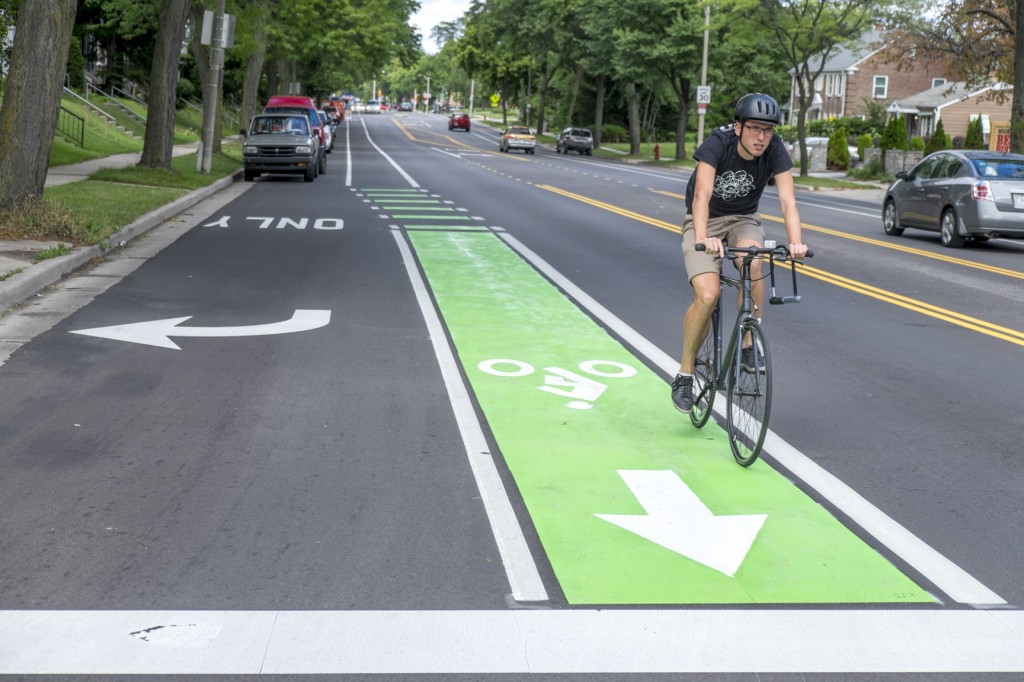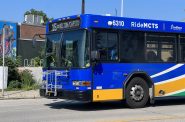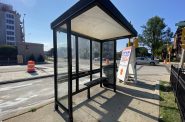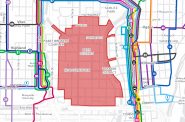Limited Funds for Bike Trails, Bike Safety
WisDOT grabs more than half of $16 million for biking, walking and spends on roads.

Green pavement markings in bike lanes can be used to highlight conflict points in mixing zones where motor vehicle and bicycle traffic cross.
Routes for people to walk and bike will be improved in more than two-dozen Wisconsin communities through federal funding awards, while another 36 eligible projects will be delayed by the limited money allocated by the Legislature to transportation alternatives.
In the two-year funding cycle, the Wisconsin Department of Transportation will distribute $15.2 million to provide federal support for 33 projects, or about one-quarter of the amount sought by cities, towns and villages to make their streets safer. Most of the projects selected will begin in 2018, with the others eligible to try again in another two years.
“With $35 million in important and eligible projects and only $15 million in funding available, it’s time for the state to consider cost sharing with the Federal dollars,” said Dave Cieslewicz, executive director of the Wisconsin Bike Fed. “This will be a Bike Fed initiative in the next state budget. It’s an important public health and safety initiative.”
Funding to provide bike and pedestrian paths falls far short of the demand, in part because of decisions made by the Wisconsin Legislature.
Under its directive, WisDOT provides less than half of the $16 million available every year for better walking and biking paths, and instead redirects about $9 million of that pool of money for road projects and other uses.
The TAP dollars cover 80 percent of a project’s cost, providing the invaluable support local communities need to make their streets safer for residents.
The largest grant awards will fund major projects to connect and expand biking trails, including the Great River State Trail, the Milwaukee County Oak Leaf Trail and the West Towne Path in Madison. Future phases of those projects also will be delayed by the limited funds. A full list of funded projects can be found here.
Some of the smaller awards will have a huge impact on safety.
For example, Milwaukee Public Schools will receive $327,504 to continue a Safe Routes to Schools Program that has taught more than 16,000 young students how to walk and bike safely on city streets. Safe Routes has also created a bike shop in North Division High School and trained a dozen bike mechanics.
“As an upper elementary teacher who strongly supports the health benefits of walking and biking for my students, I really appreciate our partnership with the Wisconsin Bike Fed and the flexibility and hard work of the staff members,” said Paula Holman, a teacher at Fernwood Montessori School. “They are doing a great deal to make it easier and safer for our students to walk or bike to school.”
Grants awarded will also help school districts in La Crosse, Green Bay, Appleton, New London, Madison, Fort Atkinson and most of central Wisconsin start similar Safe Routes programs.
The following is a short list of projects that will be delayed, after failing to receive funding:
- Wisconsin River Trail phase 2, proposed by the City of Boscobel. Project total $1.8 million. Federal share $1.47 million.
- Madison West Towne Path – Princeton / All Saints segment, proposed by the City of Madison. Total project $2,47,500. Federal share $1,966,000.
- Badger State Trail Tunnel at McKeey Road, proposed by City of Fitchburg. Total project $1,663,613. Federal share $1,330,890.
- Glacial River Trail Connection, Fairmont Dr. to Wright Road, proposed by City of Janesville. Total project $1,304,200. Federal share $1,043,360.
- Milwaukee Bicycle Boulevard – S. Water St. to 40th St. via E. Washington and Scott Sts. Total project $932,320. Federal share $745,856.
- Mayfair Road Bicycle and Pedestrian Underpass. Proposed by City of Wauwatosa. Total cost $816,699. Federal share $653,359.
- Milwaukee Bike Share Phase 3 – 10 locations. Total cost $662,000. Federal share $529,600.
- East-West Utility Corridor Commuter Trail. Proposed by the City of Greenfield. Total cost $1,571,000. Federal share $1,256,800.
- Bike path from N. Fourth Street to Riverside Park in Watertown. Proposed by City of Watertown. Total cost $1,263,049. Federal share $1,010,439.
- Pine River Trails Safe Routes to Schools Phase 2. Proposed by City of Richland Center. Total cost $959,224. Federal share $767,379.
Transportation
-
MCTS Adds 28 New Buses
 Jul 13th, 2024 by Graham Kilmer
Jul 13th, 2024 by Graham Kilmer
-
MCTS Designing New Bus Shelters
 Jul 10th, 2024 by Graham Kilmer
Jul 10th, 2024 by Graham Kilmer
-
MCTS Updates RNC Bus Detours To Better Serve Downtown, Riders
 Jul 9th, 2024 by Jeramey Jannene
Jul 9th, 2024 by Jeramey Jannene





















Kinda need money for roads if you plan on having bike paths on them, safe ones anyways.
I don’t even know where to begin with the above comment.
Can the local municipalities pay for their projects or are all of these 100% dead since they didn’t make the cut for state money?